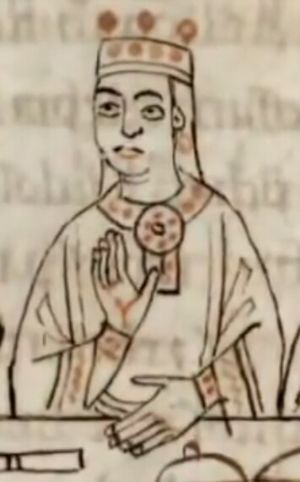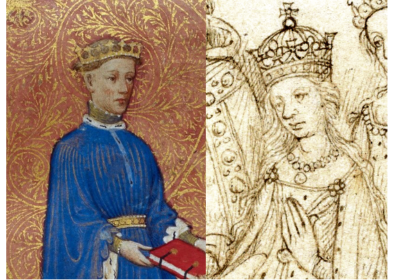ABOVE: Empress Matilda from the Gospels of Henry the Lion, c.1188, just 21 years after Matilda’s death.
Empress Matilda, daughter and heir of Henry I, mother of Henry II, and ultimately unsuccessful claimant to the throne of England in her own right, is often titled as ‘The Lady of the English.’ There is a perception that she did not take the title of ‘queen’ because of the suspect nature of female rulership, she could not bear such a lofty title in her own right. However, this view ignores the language differences between the 12th and 21st centuries.
Firstly, it is important to remember that modern English did not exist at this time; the nobility used Ango-Norman French and Latin, the commoners used Old English. Therefore, ‘Lady of the English’ is a translation of the title Matilda actually used, and I would argue that for a modern audience, it is a poor translation which fails to convey the status and dignity of the title she actually bore.

Now let’s look at the fact that she didn’t call herself ‘Queen Matilda.’ The 11st century equivalent of ‘queen’ was ‘cwen.’ The problem for Matilda is that this word had the strong implication of ‘wife of the king,’ rather than ruler in her own right. This was important to Matilda; it was her bloodright, not her husband’s. In fact, she did used the title ‘feme sole’ – woman acting alone – for a few years at the start of her civil war.

So why didn’t she use regina, like the other queen regnants of England, from Mary I to Elizabeth II, did? The term was in use at this time, albeit usually, but not definitively by queen consorts. Well, there is precedence for this. Kings of this period often went by ‘dominus’ before their coronation, then rex after they were crowned. If Matilda had been crowned, she probably would have switched to regina. In fact, during the months she did have control of England as de facto queen, a number of charters did title her ‘regina Anglorum.’
The title she actually laid claim to was ‘domina Anglorum.’ ‘Domina’ is the feminine equivalent of ‘dominus,’ and it can be translated in a number of ways. The literal translation of ‘domina’ is ‘mistress,’ whilst the literal translation of the masculine ‘dominus’ is master. ‘Dominus’ was used for any male leader, ranging from head of the household, to an imperial title. Given that Matilda held on to the imperial title from her first marriage, I think we can safely assume that she assigned ‘domina’ the most superlative meaning possible.
During this period ‘lady’ did have similar connotations, and was a fairly appropriate equivalence. ‘Hlaefdige’ in Old English literally translates to ‘lady,’ but was used to refer to Anglo-Saxon women who held power and ruled in their own right. So ‘Lady of the English’ did hold the connotations of high status and power as the most imperial interpretation of ‘domina Anglorum,’ and was a contextually appropriate translation. Unfortunately, this is no longer the case; to our modern sensibilities, ‘Lady of the English’ makes it sound like Matilda was not allowed to claim a higher title equivalent to king, when in fact, she was claiming the best equivalent term available.





